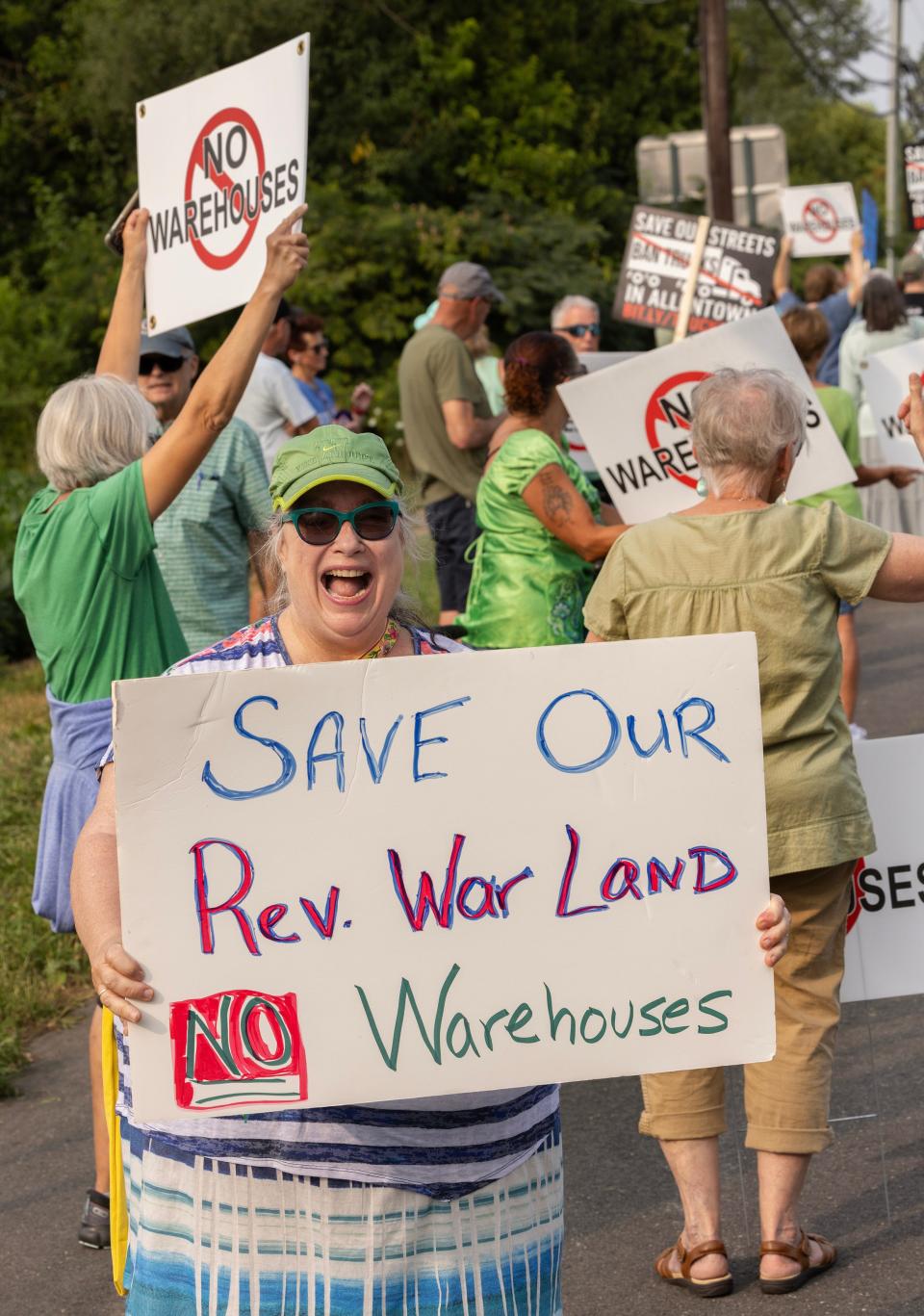New Jersey needs a warehouse czar — yesterday. Here's why
Regarding "Should taxpayers buy Revolutionary war land slated for warehouses? Monmouth County might," app.com, Aug. 24:
Dan Radel reported on how many of us are working with our neighbors in Allentown and Upper Freehold to fight two warehouses with a combined size of 500,000 square feet on approximately 60 acres of farmland. I know firsthand the challenges of these community-based efforts to say “no” to warehouses. In our case, the Upper Freehold land in question includes an important British encampment/Revolutionary War site that was on the way to what would become the famous and historic Battle of Monmouth. Each warehouse fight has its own story to tell, but one thing is for certain: New Jersey is too saturated with warehouses.
Collaborating with supportive elected officials — in our case, Allentown Borough Mayor Thomas Fritts and council, and our Monmouth County Commissioners, in particular, Commissioner Ross Licitra — we have been so fortunate to establish new ways to discuss curbing our warehouse development. Clean Water Action NJ has been assisting us with warehouse opposition, as does Zero Emissions and Warehouse Organizer Tolani Taylor. We believe New Jersey needs a NJ Emergency Legislative Summit on Warehouses in 2024. Our local battle remains unresolved, but we have built relationships that will last past this preservation fight to keep the land open, farmed, and the historic elements preserved.
While our efforts continue to support the purchase of the land through creative partnerships with Monmouth County officials and the public, private, and non-profit sectors, I have realized that there is no one person or one NJ agency where we can go to get help. No clearinghouse for warehouse-related information exists, where staff are working all day and every day exclusively on warehouse-related issues. That is why I proposed personally to Gov. Phil Murphy’s chief of staff that our governor consider the creation of a statewide warehouse czar.
I am not alone in my frustration stemming from outreach to various New Jersey state agencies. For the average person, without a team of paid lobbyists, political contacts and huge staffing, outreach efforts become daunting. Issues of air-pollution emissions, from cars and trucks, represent toxic nightmares. Sometimes, to get to one phone conversation takes weeks. Follow-up can take far longer. Just in our township, these two warehouses, if approved, would produce 2,500 tons of pollution annually, based on using EPA formulaic standards for 2,200 cars and trucks daily.
What will Monmouth County do?: Should taxpayers buy Revolutionary war land slated for warehouses?
Preservationist perspective: Proposed Upper Freehold warehouse destroys NJ history — and our environment
Hey, that is another slap that contributes to global warming. And the development is adjacent to the Overburdened Community designation by the state Department of Environmental Protection within part of Upper Freehold. It is across Interstate 195, and we know we cannot build houses or warehouses on that roadway. As of Aug. 28, more than 3,220 local people signed a Change.org Upper Freehold anti-warehouse petition about the water quality and storm water run-off issues urging that the development be stopped. But, within a tangled bureaucratic mess where the average person cannot figure out how to even reach the right people in NJDEP or other agencies, how do the citizens’ voices get heard?

The Planning and Zoning Boards become the last point of refuge for people trying to fight warehouse development, but sadly, many communities like ours, Upper Freehold, developed master plans in the early 2000s that worshipped the ratables myth and dumped warehouses on borders with other neighboring towns. As our town let more development in, more residents moved closer to where the proposed warehouses might be located if approved. To top it off, without a vocal citizenry readily mobilized, the local leaders who are opposed to the idea of preservation and who support warehouses can prevail. It’s so easy to say, “vote them out.” In cases like our town, where one-party rule has dominated for decades, elected officials become jaundiced and arrogant. Many Upper Freehold officials remain opposed to this preservation effort.
Finally, let’s talk facts. When looking at New Jersey statistics one obvious point emerges, New Jersey doesn’t need any new warehouses. A Newmark Research Report from 2022 shows saturation. In Monmouth County 16,589,025 square feet of warehouse space already exists — with a 7.1% vacancy rate. Off Exit 7A, warehouses have 29,407,154 square feet. The same report noted that, including total warehouse space in northern and central New Jersey, the Garden State is home to 677 million square feet of warehouse space. There are underused and empty warehouses in and bordering Monmouth County seeking to lease space.
Are we trying to win the Guinness World Record for most warehouses in the United States? The way we are going the Garden State is going to be renamed the Warehouse State.
New Jersey needs a warehouse czar.
Sue Kozel is former vice chair of the Upper Freehold Vision Committee that became the Upper Freehold Historic Farmland Scenic Byway Committee.
This article originally appeared on Asbury Park Press: NJ warehouse policy: Garden State needs a warehouse czar

